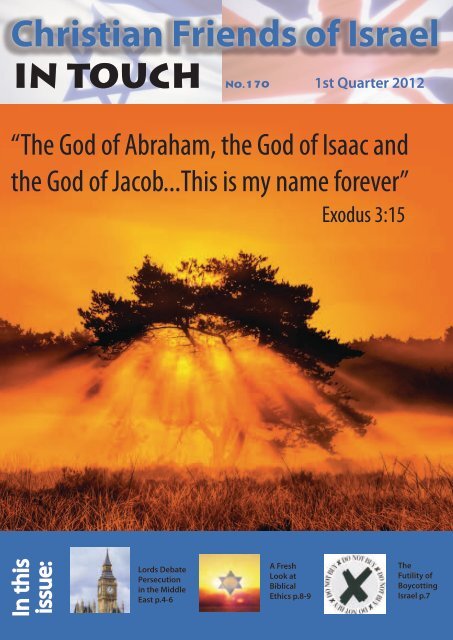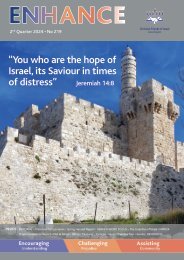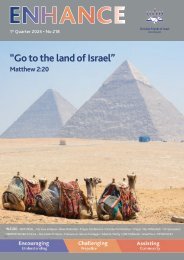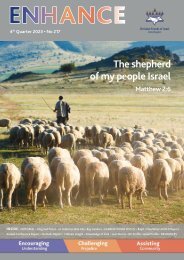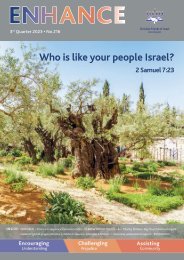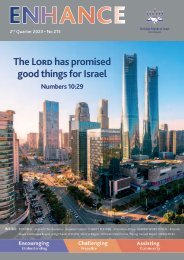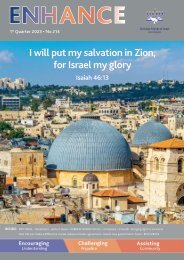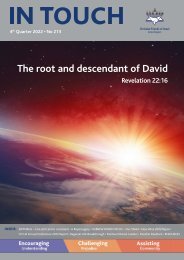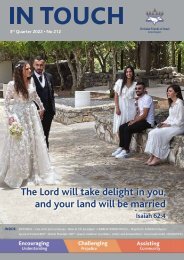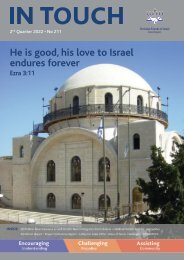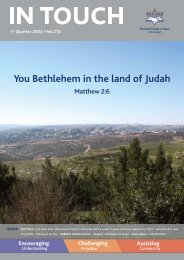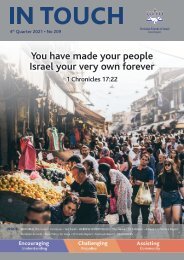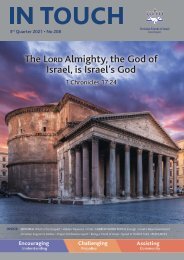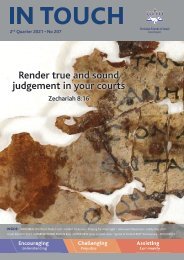In Touch Quarter 1 - 2012
You also want an ePaper? Increase the reach of your titles
YUMPU automatically turns print PDFs into web optimized ePapers that Google loves.
Christian Friends of Israel<br />
IN TOUCH No.170 1st <strong>Quarter</strong> <strong>2012</strong><br />
“The God of Abraham, the God of Isaac and<br />
the God of Jacob...This is my name forever”<br />
Exodus 3:15<br />
<strong>In</strong> this<br />
issue:<br />
Lords Debate<br />
Persecution<br />
in the Middle<br />
East p.4-6<br />
A Fresh<br />
Look at<br />
Biblical<br />
Ethics p.8-9<br />
The<br />
Futility of<br />
Boycotting<br />
Israel p.7
FROM GENERATION<br />
TO GENERATION<br />
<strong>In</strong> <strong>Touch</strong><br />
is the newsletter of<br />
Christian Friends of Israel<br />
UK<br />
CFI-UK seeks to bless Israel by<br />
means of practical and moral<br />
support, and to serve the Church in<br />
teaching about God’s purposes for<br />
Israel and the Hebraic roots<br />
of our faith.<br />
CFI also produces a monthly News<br />
Report, a monthly Prayer Letter and<br />
a Middle East Update CD/MP3.<br />
Please send for full details of the<br />
practical projects and also of the<br />
many teaching resources available.<br />
As an educational charity,<br />
we carry a variety of<br />
resources relevant to our<br />
purpose. We do not<br />
necessarily endorse every<br />
view expressed by our<br />
guest writers or authors<br />
of these resources.<br />
Published by:<br />
CFI Communications<br />
PO Box 2687<br />
Eastbourne<br />
BN22 7LZ<br />
Tel: 01323 410810<br />
Fax: 01323 410211<br />
Email: info@cfi.org.uk<br />
Websites: www.cfi.org.uk<br />
www.isrelate.com<br />
www.keshercourse.org.uk<br />
Registered Charity<br />
No. 1101899<br />
Front Cover Image:<br />
Copyright © 2011 Teusrenes<br />
Dreamstime.com<br />
CFI-UK’s Chief Executive Jacob Vince explains the<br />
importance of passing on Biblical teaching<br />
Over the<br />
past year<br />
we have<br />
continued to fulfil<br />
our remit through<br />
the three strands<br />
of education,<br />
advocacy and<br />
aid in both<br />
representing and<br />
enabling our supporters to be good<br />
and trusted Christian friends of Israel.<br />
As we come into this New Year we<br />
plan to continue in this undertaking<br />
focussing particularly on reaching<br />
other would-be supporters in the<br />
middle ground who, if prayerfully<br />
and carefully explained and shown,<br />
will see the importance of providing<br />
Christian friendship to Israel. This<br />
we plan to do through participating<br />
in teaching days similar to those held<br />
toward the end of last year: Israel Who<br />
Cares? in Oxford with 300 present and<br />
Israel’s Future and Ours in Crawley with<br />
250 delegates plus 100 over-subscribed.<br />
Another important element in reaching<br />
the middle ground is the Christian<br />
Festivals where we are able to resource<br />
a stall and reach out beyond to new<br />
would-be supporters and through our<br />
network of Area Representatives.<br />
We are also very conscious of the<br />
biblical principle of ensuring the<br />
message is imparted from generation<br />
to generation. The fact is that those<br />
of the middle generation by and<br />
large have not developed a fuller<br />
understanding of the land, nation and<br />
people of Israel whether as contained<br />
in the Bible (law, prophets, psalms and<br />
apostles) or the Jewish people’s role,<br />
influence and suffering throughout the<br />
history of the Church and the place and<br />
plight of Israel today. It is therefore<br />
incumbent upon us that we use every<br />
endeavour to communicate a fuller<br />
understanding of Israel to the next<br />
generation. The technical term for this<br />
is intergenerational equity. We must<br />
be careful not to overindulge ourselves<br />
on the excellent deeper teaching<br />
available to us, at the expense of underreaching<br />
others who are yet to start on<br />
their journey of understanding. For<br />
this I commend to you the new and<br />
accessible Israel in Brief booklet series<br />
which is a compilation of themed<br />
articles from a range of authors (as<br />
advertised in a previous mailout).<br />
The biblical principle so far as workers<br />
in the field are concerned is found<br />
in Paul’s relationship with Timothy.<br />
This we are endeavouring to encourage<br />
“Those of the middle generation by<br />
and large have not developed a fuller<br />
understanding of the land, nation and<br />
people of Israel”<br />
among our Area Representatives. An<br />
update of the work they are doing<br />
and our new Area Reps will appear<br />
in the next <strong>In</strong> <strong>Touch</strong> magazine. So far<br />
as concerns encouraging our existing<br />
supporters to pass on their Israel<br />
understanding, the biblical principle<br />
appears to start with family. Using<br />
Timothy again as an example, this is<br />
shown through his grandmother Lois<br />
and his mother Eunice (2 Timothy 1:5).<br />
Likewise, fathers are exhorted to bring<br />
up their families in the training and<br />
instruction of the Lord (Ephesians 6:4).<br />
Of course the time-honoured example<br />
of the grandfather, father and son<br />
relationship is seen in Abraham, Isaac<br />
and Jacob permeating the whole Bible.<br />
2 // IN TOUCH
God also said to Moses, “Say to the<br />
Israelites, ‘The LORD, the God of your<br />
fathers—the God of Abraham, the God<br />
of Isaac and the God of Jacob—has sent<br />
me to you.’ This is my name forever, the<br />
name by which I am to be remembered<br />
from generation to generation.”<br />
(Exodus 3:15)<br />
They were not perfect, yet God<br />
repeatedly and forever identifies<br />
himself as the God of Abraham, the<br />
God of Isaac and the God of Jacob.<br />
God relates to each one individually<br />
but also across the generations, missing<br />
no one out. By contrast, concerning<br />
our imparting a fuller understanding<br />
of Israel we are potentially in danger<br />
of missing out both the middle and<br />
following generation.<br />
As well as applying the principle to<br />
our close family, it can equally apply to<br />
the family of God, the places where we<br />
fellowship. This should involve us all<br />
and I would encourage us, no matter<br />
how difficult it might seem at times,<br />
to make sure we are committed to a<br />
local congregation in all Godly aspects<br />
of its work and service, not just Israel.<br />
Our fuller understanding should mean<br />
we are more committed rather than<br />
less and, sensitive to the prompting<br />
of the Holy Spirit as to God’s timing,<br />
graciously shares our understanding<br />
of God’s purposes concerning Israel<br />
when called to do so.<br />
“Now to him who is able to do<br />
immeasurably more than all we ask<br />
or imagine, according to his power<br />
that is at work within us, to him be<br />
glory in the church and in Christ Jesus<br />
throughout all generations, for ever<br />
and ever! Amen.” (Ephesians 3:20-21)<br />
CFI-UK PRAYER CONFERENCES<br />
CFI-UK Trustee Jenny Forbes encourages us to intercede for Israel at our<br />
upcoming regional conferences<br />
<strong>In</strong> Daniel 9:2 we find that Daniel has<br />
come to a place of understanding<br />
with regard to the ending of the Exile<br />
in Babylon. Having read the Scriptures,<br />
he realises that the 70 years of Exile<br />
prophesied by Jeremiah are coming to<br />
an end and in Daniel 9:3 he writes “So<br />
I turned to the Lord God and pleaded with<br />
him in prayer and petition, in fasting and in<br />
sackcloth and ashes.”<br />
This is serious intercession. He could<br />
have decided that the ending of the Exile was a foregone<br />
conclusion and he could now sit back and wait for it all to<br />
happen. Daniel does exactly the opposite. He prays all the<br />
more earnestly and with fasting. He has an understanding<br />
of the way the enemy works and, therefore, the need for<br />
spiritual warfare and enlightened intercession knowing that<br />
the Devil would do all he could to prevent the Jews from<br />
returning to their homeland. Daniel understood the times<br />
and knew how to pray and intercede.<br />
As we read the Scriptures, and see what is going on in<br />
the world today, particularly in the Middle East, we too see<br />
prophecy being fulfilled. How do we react? Are we content<br />
to sit back and decide that it will all work out anyway? Do<br />
we feel that we have prayed enough and that God’s purposes<br />
will be accomplished? Maybe we are just tired and weary<br />
with the battle? Or do we, with understanding of the wiles<br />
of the evil one, realise that intercession and spiritual warfare<br />
are vital for the times we are living in?<br />
<strong>In</strong> CFI we are realising, more and more, the importance of<br />
understanding the days we are in and knowing how to pray<br />
into the complex situations that are all part of being involved<br />
with Israel. We sense that now is the time to increase our<br />
commitment to prayer and intercession on behalf of Israel<br />
and, indeed our own nation.<br />
For a number of years we have held a prayer conference in<br />
Rockwell Green, near Wellington and Taunton in Somerset.<br />
These have been valuable times of intercession, seeking the<br />
Lord and fellowshipping together. We now believe that we<br />
should increase the number of prayer conferences within the<br />
nation. This will enable more of you to be involved without<br />
having to travel too far.<br />
The dates and locations of these prayer conferences are as<br />
follows:<br />
March 22 nd –24 th - Rockwell Green, Wellington, Somerset<br />
April 16 th –18 th - Llandudno, North Wales<br />
May 2 nd –4 th - Clayhall, near Barkingside, Essex<br />
June 25 th –27 th - Normanby, Middlesbrough<br />
The promise of the Lord for those who ‘wait on Him’ is<br />
renewed strength, soaring like eagles, running without<br />
weariness, walking without feeling faint. Together, we have<br />
an opportunity during this year to seek His face, to plead<br />
with Him on behalf of Israel and our own nation.<br />
Hebrews 10:25 records “but let us encourage one another –<br />
and all the more as you see the Day approaching.” We invite you<br />
to join with us at one of these regional prayer conferences,<br />
so that together we can be encouraged,<br />
experience a fresh touch of the Holy<br />
Spirit upon our lives, and a renewed<br />
anointing for intercession and prayer.<br />
A brochure with fuller details<br />
and how to register for one of these<br />
conferences should have accompanied<br />
this copy of “<strong>In</strong> <strong>Touch</strong>.” If not, then<br />
please contact the CFI-UK office in<br />
Eastbourne and request a copy.<br />
CFI.ORG.UK // 3
RELIGIOUS PERSECUTION<br />
IN THE MIDDLE EAST<br />
The House of Lords recently saw a debate on persecution of Christians in<br />
the Middle East. Here are some highlights of what was said.<br />
Dr. Rowan Williams: My Lords,<br />
many people these days have a short<br />
and skewed historical memory. It<br />
is all too easy to go along with the<br />
assumption that Christianity is an<br />
import to the Middle East rather<br />
than an export from it. Because the<br />
truth is that for two millennia the<br />
Christian presence in the Middle<br />
East has been an integral part of<br />
successive civilisations. We are not<br />
talking about a foreign body, but<br />
about people who would see their<br />
history and their destiny alike bound up with the countries<br />
where they live, and bound up in local conversations with<br />
a dominant Muslim culture, which they are likely to see<br />
in terms very different from those that might be used by<br />
western observers.<br />
Yet at the present moment, the position of Christians in<br />
the region is more vulnerable than it has been for centuries.<br />
Issues in Egypt are inevitably among the most immediate in<br />
the minds of many of us just now. Whether in Egypt, Israel<br />
and Palestine or Syria, what were once relatively secure<br />
communities are now increasingly seen as vulnerable.<br />
The phenomenon of the Arab spring has brought some<br />
new considerations into play. Even as we speak, the future<br />
of the Arab spring is still deeply unclear.<br />
The continued presence of Christians in the region is<br />
essential to the political and social health of the countries of<br />
the Middle East. Their<br />
presence challenges<br />
the assumption that<br />
the Arab world and<br />
the Muslim world<br />
are just one and the<br />
same thing, which<br />
is arguably good for<br />
Arabs and Muslims<br />
alike.<br />
A Palestinian<br />
Christian friend of<br />
mine was to say when<br />
asked by westerners,<br />
“When did your family<br />
become Christians?”<br />
“About 2,000 years<br />
ago”. We need some<br />
crystal clear guidance<br />
and education on these things if we are to avoid what is both<br />
a ludicrous and an insulting outcome. <strong>In</strong> conclusion, let me<br />
say how very grateful I am for the opportunity to raise these<br />
issues today in your Lordships’ House at a time when they<br />
could hardly be more pressing.<br />
My contention has been that the security and well-being<br />
of the historic Christian communities in the region are<br />
something of a litmus test in relation to these wider issues of<br />
the political health of the region. I expect some distinguished<br />
contributions to the debate. Perhaps I may take this<br />
opportunity in particular of acknowledging with gratitude<br />
the presence of the noble Lord, Lord Sacks, in the Chamber<br />
and look forward to his contribution to our deliberations. I<br />
am particularly aware that the observance of Shabbat will<br />
oblige him to leave the Chamber early so I am all the more<br />
appreciative of his support. I beg to move.<br />
Lord Patten: It seems clear that all<br />
non-Islamic faith groups in the Middle<br />
East are in it together. It means facing<br />
up openly to the fact that some Islamic<br />
groups, however many good and<br />
moderate adherents there may be,<br />
are self-professed militants against<br />
Christians and Jews alike.<br />
We evidence this in their own words<br />
and actions. One sad manifestation of<br />
this in the Western world today is not<br />
just to brush this issue under the carpet but to feel that it is<br />
not possible or polite even to talk about it in decent society.<br />
Yet the fate of Christians in the Middle East is indivisible<br />
from the fate of Jews there.<br />
There can be no walking on the other side of the faith road<br />
in the Middle East in the face of a self-declared agenda by<br />
some of religious cleansing in some parts of the region. We<br />
must not do that any more than we can, even in the Palace of<br />
Westminster, ignore the manifestly Newspeak anti-Zionism,<br />
which concentrates as a surrogate on the Jew as a nation—I<br />
borrow from the noble Lord, Lord Sacks, on this—rather<br />
than on the Jew as a person, as it was in the old-style and<br />
now wholly non-PC anti-Semitism. At least in the Middle<br />
East, people are honest about it; we should be honest about<br />
it here.<br />
However threatening this may be perceived to be in this<br />
country it is nothing like the threats facing the last Jews in<br />
Baghdad, nor the last few Jews in Iran. But then, it cannot be<br />
very nice for the last remaining 13,000 of my co-religionists<br />
left in Iran either. The pace of religious cleansing is gathering.<br />
4 // IN TOUCH
Lord Turnberg: Scarcely a<br />
week goes by when we do not<br />
hear of yet another outrageous<br />
attack on one or other Christian<br />
community in the Middle East.<br />
<strong>In</strong> Egypt we hear about the<br />
Copts, in Lebanon the Christians<br />
are leaving in their droves, in<br />
northern Iraq they are terrorised<br />
and in the Horn of Africa tales<br />
of persecution and worse are so<br />
commonplace that the media<br />
have more or less stopped<br />
reporting them.<br />
Even in Palestine, the numbers<br />
of Christian Arabs are falling rapidly. <strong>In</strong> Bethlehem, the<br />
epicentre of Christianity, they feel increasingly unwelcome and<br />
now they are a marginalised minority where once they were in<br />
the majority—all this despite the commonly held view that it is<br />
not only the result of the Arab-Israeli conflict.<br />
There are now barely 50,000 Christians in the whole of the<br />
West Bank. Of course, Christians are not alone in being chased<br />
out. The Baha’i faith has been eliminated from Iran and other<br />
Middle East countries, and the Jews have a long history of<br />
persecution in the region. No fewer than 700,000 Jews have<br />
been driven out in the past 50 or so years; were it not for the<br />
existence of Israel, they would be refugees and dispersed<br />
around the world. It is also the case that I as a Jew would be<br />
very unwelcome in many of these countries; in fact, I would<br />
find it very hard to visit Saudi Arabia as I would not be given<br />
permission.<br />
This is troubling indeed at a time when we in the UK and<br />
the largely Christian western<br />
“The only place in<br />
the Middle East that<br />
Christians are really<br />
safe is Israel”<br />
societies are quite rightly<br />
leaning over backwards to<br />
accommodate people of every<br />
race, creed and religion. You<br />
have only to look around your<br />
Lordships’ House to see our<br />
tolerance of diversity. At the<br />
same time, fundamentalism is<br />
increasing in the Middle East along with a dangerous anti-<br />
Christian intolerance.<br />
There are two exceptions—possibly more—to this general<br />
pattern: Jordan and Israel. <strong>In</strong> Jordan the relatively benign rule<br />
of King Abdullah has allowed the Christian community to<br />
avoid the persecution seen elsewhere. <strong>In</strong> Israel, the Christian<br />
community is actually growing. The community has increased<br />
fourfold in the last 50 years. This largely Christian Arab<br />
community represents about 10 per cent of the total Arab<br />
population of 1.5 million within Israel proper and has tended<br />
to cluster in the mixed towns of Haifa, Nazareth and Jerusalem.<br />
They do relatively well there: there is a Christian Arab Supreme<br />
court judge, for example, as well as a Member of the Knesset<br />
and a winner of the Israeli prize for literature. They are well<br />
represented in academia and the professions. It is also the case<br />
that they have a lower infant mortality rate, lower even than<br />
Israeli Jews, and a higher rate of entry into higher education,<br />
especially among women.<br />
Of course, they have their problems as a minority group.<br />
They have concerns about job opportunities, for example, but<br />
that has to be kept in some sort of perspective.<br />
As Andrew White, the vicar of Baghdad mentioned by the<br />
noble and learned Lord, Lord Mackay of Clashfern, said, “the<br />
only place in the Middle East that Christians are really safe is<br />
Israel”.<br />
Lord Palmer of Childs<br />
Hill: My Lords, this is a very<br />
welcome debate. As a British Jew<br />
who enjoys religious freedom in<br />
this country, one appreciates the<br />
need for religious minorities to<br />
enjoy religious freedom in other<br />
countries, and obviously that<br />
includes Christians in the Middle<br />
East.<br />
I was particularly touched by<br />
the most reverend Primate’s<br />
comments about Christianity<br />
being an export from the Middle<br />
East, not an import. That was brought home to me when I went<br />
with Christian friends to walk the stations of the cross through<br />
Jerusalem and realised that you can still do that over beautifully<br />
paved roads in the old tradition. My Christian friends were<br />
particularly impressed that St Peter’s fish can still be fished—<br />
not the same fish, though—in Lake Kinneret [Galilee]. The<br />
tradition is there. It is not an import into the Middle East, it is<br />
an export from it, and it should remain there.<br />
Bethlehem is controlled not by Israel but by the Palestinian<br />
Authority, which bears the main responsibility for the situation<br />
faced by Christians living in Bethlehem and elsewhere on<br />
the West Bank, just as Hamas bears responsibility for the<br />
predicament of Christians living under its rule in Gaza. Of<br />
course, Israel still has control over aspects of life in the West<br />
Bank, not to mention East Jerusalem, and it is obviously<br />
involved in some ways in the affairs of Gaza. But it is not directly<br />
in control of either Gaza or the West Bank and the treatment,<br />
good or bad, of Christians in that area.<br />
<strong>In</strong> Israel itself—what might be<br />
called “Israel proper”—the Christian<br />
population is not falling but is stable, and<br />
there is religious freedom, including in<br />
Jerusalem itself. While the percentage of<br />
Christians in Bethlehem and Bethlehem<br />
district has decreased, the total number<br />
has increased. <strong>In</strong> Bethlehem city, the<br />
Christian population dropped under<br />
Jordanian rule but, since 1967, it has grown by 11 per cent in<br />
the city and 56 per cent in the district. Those are percentages; it<br />
must be remembered that, with an influx of a mainly Muslim<br />
population, percentages are one thing and numbers are another.<br />
Israel’s treatment of religious minorities may not be perfect,<br />
just as the UK’s treatment of minorities is not always perfect,<br />
but there is religious freedom and there are full civil rights<br />
for Christians living in Israel. There are so many branches of<br />
Christianity in Israel. You find every branch of the faith there.<br />
It is almost like the Jew on a desert island who builds two<br />
synagogues because he wants to resign from one of them; there<br />
has to be more than one. <strong>In</strong> Israeli politics, if you have three<br />
Jews, that is three political parties. There are masses of different<br />
branches of Christianity in the Middle East, and people forget<br />
that.<br />
It is good news that, in 2010—the last year for which I have<br />
statistics—100,000 Christians were in the central square of<br />
Bethlehem for Christmas; that is twice as many as the year<br />
before and the highest number for a decade. One can only hope<br />
that that 100,000 is increased even further this year.<br />
Please turn over to read Chief Rabbi Lord Sacks<br />
contribution to the debate.<br />
CFI.ORG.UK // 5
Lord Sacks: It was Martin Luther<br />
King who said: “<strong>In</strong> the end, we<br />
will remember not the words of<br />
our enemies, but the silence of our<br />
friends”.<br />
That is why I felt that I could not<br />
be silent today. As a Jew in Christian<br />
Britain, I know how much I, my<br />
late parents and, indeed, the whole<br />
British Jewish community owe to<br />
this great Christian nation, which<br />
gave us the right and the freedom<br />
to live our faith without fear. Shall<br />
we not, therefore, as Jews stand up<br />
for the right of Christians in other parts of the world to live<br />
their faith without fear?<br />
And fear is what many Christians in the Middle East feel<br />
today. We have already heard today about the plight of Coptic<br />
Christians in Egypt, of Maronite Christians in Hezbollahcontrolled<br />
areas in Lebanon, of the vast exodus of Christians<br />
from Iraq and of the concern of Christians in Syria as to what<br />
might happen there should there be further destabilisation.<br />
<strong>In</strong> the past year, we have heard of churches set on fire, of a<br />
suicide bombing that cost the lives of 21 Christians as they<br />
were leaving a church in Cairo, of violence and intimidation<br />
and of the mass flight of Christians, especially from Egypt. I<br />
believe that we must all protest this series of assaults—some<br />
physical, others psychological—on Christian communities in<br />
the Middle East, many of which have long, long histories. I,<br />
and I hope all other Jews in Britain, stand in solidarity with<br />
our Christian brothers and sisters, as we do with all those<br />
who suffer because of their faith.<br />
I have followed the fate of Christians in the Middle East<br />
for years, appalled at what is happening and surprised and<br />
distressed by the fact that it is not more widely known. We<br />
know how complex are the history and politics of the Middle<br />
East and how fraught with conflicting passions, but there are<br />
two points that I wish to make that deserve reflection.<br />
First, on the Arab spring, which has heightened the fear<br />
of Christians in many of the countries affected, we make<br />
a great intellectual mistake in the West when we assume<br />
that democracy is, in and of itself, a step towards freedom.<br />
Usually, that is the case, but sometimes it is not. As Alexis<br />
de Tocqueville and John Stuart Mill pointed out in the 19th<br />
century, it may merely mean the “tyranny of the majority”.<br />
That is why the most salient words in the current situation<br />
are those of Lord Acton, in his great essay on the history of<br />
freedom, who said: “The most certain test by which we judge<br />
whether a country is really free is the amount of security<br />
enjoyed by minorities”.<br />
That is why the fate of Christians in the Middle East today is<br />
the litmus test of the Arab spring. Freedom is indivisible, and<br />
those who deny it to others will never gain it for themselves.<br />
Secondly, religions that begin by killing their opponents<br />
end by killing their fellow believers. Today, in the Middle<br />
East and elsewhere, radical Islamists fight those whom they<br />
regard as the greater and lesser Satan, but earlier this week<br />
we mourned the death of 55 Shia worshippers at a mosque in<br />
Kabul and another 28 Shia who were killed in a terror attack<br />
in Iraq. Today, the majority of victims of Islamist violence<br />
are Muslim, and shall we not shed tears for them, too? The<br />
tragedy of religion is that it can lead people to wage war<br />
in the name of the God of peace, to hate in the name of the<br />
God of love, to practise cruelty in the name of the God of<br />
compassion and to kill in the name of the God of life. None of<br />
these things brings honour to faith; they are a desecration of<br />
the name of God.<br />
May God protect Christians of the Middle East and people<br />
of faith who suffer for their faith, whoever and wherever<br />
they are.
WHY BOYCOTTING ISRAEL<br />
WON’T SOLVE ANYTHING<br />
Award winning journalist Khaled Abu Toameh writes on why boycotting Israel is pointless<br />
and how the Arab Spring is causing concern among Christians in the Middle East.<br />
<strong>In</strong> his annual Christmas message<br />
to the world, Bethlehem<br />
mayor Victor Batarseh called<br />
for a comprehensive boycott of<br />
Israel, arguing that this would<br />
force the Jewish state to return<br />
to the negotiating table with the<br />
Palestinians.<br />
"It worked with Apartheid South<br />
Africa," Batarseh declared. "We<br />
call for boycotting Israel culturally,<br />
educationally, in sports, economics<br />
and trade. We want peace, but boycott is the only language<br />
that Israel understands."<br />
The mayor's anti-Israel message came at a time when<br />
Christians throughout the Arab world -- and in Bethlehem<br />
and the Gaza Strip -- are facing serious threats. But of<br />
course Batarseh has chosen to bury his head in the sand<br />
and does not want to look around him and see what is<br />
happening to his fellow Christians.<br />
The Bethlehem mayor's Christmas message completely<br />
ignored the fact that the "Arab Spring" has been anything<br />
but a blessing to Christians living in the Arab countries.<br />
According to Rita Daou, a reporter for Agence France<br />
Press, "The rise of Islamist movements in countries swept<br />
by the Arab revolutions has sent shudders throughout the<br />
region's Christians who fear for their survival and question<br />
the make-up of the Middle East."<br />
The Palestinian Authority has done little to protect<br />
Christians against assaults by Muslims -- including rape,<br />
intimidation, land theft and financial extortion. But these<br />
are all "sensitive" issues that many Christian leaders do<br />
not want to discuss in public out of fear of being accused<br />
of serving the Israeli "propaganda machine."<br />
This is why Batarseh and many leaders of the Christian<br />
community deliberately ignore what happened in 2002<br />
in Bethlehem, when dozens of Muslim gunmen stormed<br />
the Church of Nativity to escape from Israeli soldiers. The<br />
gunmen hid inside the church on Manger Square for five<br />
weeks. Priests later complained that they and some nuns<br />
had been held hostage by the gunmen, who also desecrated<br />
the church by smoking, drinking alcohol and littering.<br />
Christian leaders who ignore the torching of churches in<br />
Egypt and the persecution of Christians there and in Iraq<br />
and other Arab countries are betraying the cause of their<br />
people. Have these leaders ever asked what is happening<br />
to the few Christians who still live under Hamas in the<br />
Gaza Strip?<br />
It is hard to see how boycotting Israel "culturally<br />
and educationally" could help solve the plight of Arab<br />
Christians.<br />
Batarseh could have done a service to his people had<br />
he, for example, talked in his message about the fact that<br />
many Christian families continue to leave Bethlehem in<br />
search of a better life in the West.<br />
The claim that Christian families flee the Palestinian<br />
territories because of Israel's security measures is<br />
irrelevant. Christian emigration started long before Israel<br />
captured the West Bank and Gaza Strip in 1967.<br />
Also, the claim that Christians leave because of the bad<br />
economic situation is also invalid because the same would<br />
have applied to Muslim Palestinians.<br />
The truth is that Christians leave Bethlehem mainly<br />
because they do not feel comfortable living as a tiny<br />
minority in their city.<br />
<strong>In</strong> the 2005 Palestinian municipal election, Hamas gained<br />
the majority of the open seats of the Bethlehem municipal<br />
council, which consists of 15 elected members, including<br />
the mayor and deputy mayor.<br />
Since its establishment in 1994, the Palestinian Authority<br />
has done almost nothing to encourage Christian families<br />
to stay.<br />
Boycotting Israel "culturally and educationally" is<br />
certainly not going to solve the problems and dangers<br />
facing Arab Christians. For now, Israel remains the only<br />
place in the Middle East where Arab Christians feel<br />
protected and safe.<br />
This article first appeared on the Hudson <strong>In</strong>stitute’s website hudson-ny.org. Used with permission<br />
CFI.ORG.UK // 7
ETHICS - NOW & THEN<br />
Keren Hannah Pryor encourages us to take a fresh look at ethics<br />
and let love motivate our morality during <strong>2012</strong>.<br />
Shalom to you dear reader.<br />
<strong>In</strong> addition to Halleluyah<br />
and Amen I can be sure<br />
that Shalom is one of at least<br />
three Hebrew words that you<br />
are familiar with. If I were to ask<br />
you what it means, you might<br />
well answer: Peace, Greetings,<br />
Hello, Goodbye, and all would<br />
be correct. I would like to draw<br />
your attention to another similar<br />
sounding word by examining the three root letters of<br />
the word Shalom. The word is Shalem, which means<br />
‘whole’ or ‘perfect’. Each root letter of a Hebrew word<br />
reflects some of the meaning inherent in a word that is<br />
derived from it. <strong>In</strong> this case:<br />
Shin - Lamed - Mem v l mi<br />
The first letter is Shin v. Notice the three branches,<br />
joined in one, each with a little flame. This letter indicates<br />
the Name of God - El Shaddai - and also His Presence<br />
by His Spirit - the Shekinah.<br />
It, therefore, represents the<br />
invisible dimension of the<br />
spirit.<br />
The third letter is Mem m,<br />
which can represent a womb<br />
that produces physical life.<br />
A word chiefly associated with mem is mai’yim, water.<br />
Also Mashiach, Messiah, God’s Presence physically<br />
with us in His uniquely born Son - Immanuel.<br />
The middle letter is Lamed l. It represents the mind,<br />
and its meaning is lamad or lomed, to study or learn;<br />
from which the word talmid, student or disciple, is<br />
derived. Notice the shape. It is reaching up as if to<br />
connect the physical earthly realm with the spiritual.<br />
It even has a small flame at its crown. Situated as it<br />
is, between the other two letters, it is the bridge that<br />
connects the two. As those who believe that the Bible is<br />
the revealed Word of God, and is the Truth upon which<br />
we stand, we use our minds to study and learn in order<br />
to connect and understand our physical existence with<br />
the eternal realm of the spirit.<br />
To be Shalem, whole and in harmonious balance,<br />
perfectly fulfilled, is what we aim for as talmidim,<br />
disciples of Messiah. We strive to learn, by the Spirit<br />
of God, to live our lives more fully according to His<br />
Word and purposes and to be constantly filled with His<br />
Shalom! Amen? Halleluyah!<br />
It is to this end, to learn and to live more Shalem in<br />
His Shalom, that I have for some months been in quite<br />
intense preparation for the weekly email series that was<br />
introduced on Tuesday January, 3 rd , entitled: Ethics -<br />
Now and Then. (The studies are sent out, without cost,<br />
via email once a week. If interested you can sign up on<br />
the ministry’s website: www.jcstudies.com<br />
That is not intended to convey that we should consider<br />
the matter of ethics only occasionally, now and then,<br />
but rather that biblical ethics, God’s guidelines of how<br />
to live a life pleasing to Him, should be affecting our<br />
lives NOW - today - in the present. Also, on the other<br />
hand, we need to be aware of THEN - both the future,<br />
looking forward to eternity, and looking back to the<br />
past. As Winston Churchill once said, “The further back<br />
you can look the further forward you are likely to see”.<br />
This concept is appropriate to consider as we now go<br />
forward into the new calendar year of <strong>2012</strong> and it poses<br />
at least two questions:<br />
(1) Are we anticipating what lies ahead in faith and in<br />
hope, according to the<br />
promises of God, and<br />
(2) What are we<br />
learning from the<br />
past that will help us<br />
serve Him better in<br />
the present - now?!<br />
We need to know where we have come from in order<br />
to clearly understand the present and to know how to<br />
move forward purposefully toward the future.<br />
I’d like to ask you to consider the word “ethics” for<br />
a moment and see how you define it. Maybe as moral<br />
conduct, decent behavior, rules of righteousness, fair<br />
dealings? Rules of right living are all well and good;<br />
however in the light of the Kingdom of God the question<br />
of ethics, of living a righteous life as a priest or servant<br />
of God, takes on far greater significance. It is not only<br />
about being a “good person.”<br />
Together with the foundation of the Hebrew Scriptures<br />
and the teachings of Jesus and the Apostolic writings,<br />
the basic reference used in the Ethics series is Pirkei<br />
Avot, known in English as the Chapters, or Ethics, of<br />
the Fathers (the Sages of Israel). Apart from the Bible,<br />
Pirkei Avot is considered one of the greatest sources<br />
of teaching on the practical development of character<br />
and the elevation of the spirit in Hebrew literature. It<br />
“God’s guidelines of how to live<br />
a life pleasing to Him, should be<br />
affecting our lives NOW - today - in<br />
the present.”<br />
8 // IN TOUCH
well represents the Second Temple milieu of learning<br />
and debate in which Jesus and the first disciples were<br />
immersed. <strong>In</strong>terestingly, the principle of an ethical,<br />
moral life is discussed in Pirkei Avot and it is also<br />
illustrated in its very composition. Each sage or teacher<br />
quoted offers a personal and often different perspective<br />
and yet considers the views of his colleagues with<br />
patience, respect and tolerance.<br />
There are six chapters in the book and I would like to<br />
quote a verse in the last chapter as it provides a clue for<br />
the reason we should be concerned with studying and<br />
growing in character at all. As we constantly endeavor<br />
to grow in truth as children of the Creator, may we<br />
bring greater glory and honor to His Holy Name.<br />
Avot 6:11 All that the Holy One, Blessed is He, created<br />
in His world He created solely for His glory, as it is said:<br />
“All that is created by My Name, indeed it is for My glory that<br />
I have created it, formed it, and made it“ (Isaiah 45:37). And<br />
it says: “God shall reign for all eternity” (Exodus 15:18).<br />
When we work with the Lord, who as Paul tells us<br />
in Romans 8:28, is “working all things together for<br />
good”, and whose only aim and longing for one’s life is<br />
for the best, then the moral and ethical development of<br />
one’s character is not a demanding labour, or a chore,<br />
or a “heavy load”. It will be, instead, a joy, a discovery<br />
of who one is as a child created in His image. When<br />
motivated by love, one looks more keenly to Jesus the<br />
Shepherd of our souls, our Messiah, to learn of him and<br />
to follow in the way of the Father that he came to teach<br />
and to clarify by living the perfect will of the Father.<br />
Jesus expressed it well when he said: “Father... not my<br />
will but Thine be done!” (Lk.22:42) and also in the context<br />
of the Disciples’ Prayer, “Let Thy will be done on earth<br />
as it is in Heaven!”<br />
As we go forward into the new year, <strong>2012</strong>, with<br />
gratitude, faith and hope and a determination to learn<br />
more of Him and to grow in His image, may this portion<br />
of a poem called Matins by Irish poet, John O’Donohue,<br />
be the whisper of our hearts:<br />
May I live this day<br />
Compassionate of heart,<br />
Clear in word,<br />
Gracious in awareness,<br />
Courageous in thought,<br />
Generous in love.<br />
For the sake of His Name and for His greater glory in<br />
the earth, now and for all eternity!<br />
For further study, please consider these audio CD teaching sets by the late Dr. Dwight Pryor:<br />
Hebraic Renewal And<br />
The Healing Of The Soul<br />
<strong>In</strong> this 6-session set on 3<br />
CDs, Dwight Pryor and Clay<br />
McLean discuss together how<br />
Scripture assures us that we<br />
are complete in Messiah Jesus.<br />
This set will assist<br />
anyone seeking<br />
personal growth<br />
and wholeness in<br />
their walk with God.<br />
UK Price: £13.50 (incl. p&p)<br />
Hebrew Spirituality<br />
The goal of Christian formation is to<br />
become more like Messiah Jesus. <strong>In</strong> this<br />
3-part set, Dwight Pryor explores core<br />
concepts in Hebrew spirituality for the purpose of<br />
growing up in Messiah with the help of His Spirit.<br />
UK Price: £13.50 (incl. p&p)<br />
The Highest Form of Worship<br />
Too often Christians have the attitude that prayer<br />
and worship are ‘spiritual’<br />
activities, but study is not.<br />
<strong>In</strong> these 3 messages<br />
Dwight Pryor<br />
exposes this as not<br />
Biblical and unwise.<br />
He summons the<br />
Church back to the<br />
Biblical mandate of<br />
study and obedience.<br />
UK Price: £13.50 (incl. p&p)<br />
CFI.ORG.UK // 9
10 // IN TOUCH<br />
Lowliness<br />
Hebrew Word Study with John C. P. Smith<br />
Contrary to worldly thinking, in<br />
God’s eyes humility is one of the<br />
greatest attributes: “This is the<br />
one I esteem: he who is humble and contrite<br />
in spirit, and trembles at My word” (Isaiah<br />
66:2). And, conversely, one of the worst<br />
offences is pride: “Everyone who is proud/<br />
arrogant/haughty in heart is an abomination<br />
to Yahweh” (Proverbs 16:5).<br />
The metaphor often used in the Bible<br />
for both these attributes is elevation, preserved in English<br />
words such as ‘lowly’/’lowliness’ (clearly deriving from ‘low’)<br />
and ‘haughty’/’haughtiness’ (derived “from Middle English<br />
haute ‘high in one’s own estimation’ [1430]... from Old French<br />
haut ‘high’, from Latin altus” 1 ). Even the origin of the more<br />
commonly used words ‘humble’/’humility’ conveys a picture<br />
of low elevation. It dates to the mid-thirteenth century,<br />
deriving “from Old French humble, earlier humele, from Latin<br />
humilis ‘lowly, humble’, literally ‘on the ground’, from humus<br />
‘earth.’” 1<br />
There are a number of Hebrew verbs which can be<br />
translated “be humble” (William Wilson’s Old Testament<br />
Word Studies lists ten, p. 223). The most common are hn'[' anah,<br />
[n'K' kana and lpev' shafel. There is overlap in meaning and “no<br />
thoroughgoing distinction is possible between” these three<br />
terms, though “slight distinctions may be drawn”. 2<br />
Anah, ‘to afflict, oppress, humble’, seems to stress the<br />
aspects of forcible humiliation (including rape), enforced<br />
submission, punishment and infliction of pain. For example,<br />
“[the Egyptians] appointed taskmasters over [the sons of Israel]<br />
to afflict/oppress/humble [anah] them with hard labour” (Exodus<br />
1:11). A special occurrence of this verb describes Messiah’s<br />
willing submission, allowing Himself to be afflicted and<br />
humiliated: “He was ill treated, whilst He bowed Himself<br />
(=suffered voluntarily) [anah], and opened not His mouth” (Isaiah<br />
53:7, translation by F. Delitzsch) 3 . Other words derived from<br />
the same root include wn'[''' anav ‘humble, meek’; hw'n'[] anavah<br />
‘humility, gentleness’; tWn[/ enut ‘affliction’; ynI[' ani ‘poor, weak,<br />
afflicted, humble’; ynI[\ oni ‘affliction, poverty’; tynI[]T; ta‘anit<br />
‘humiliation’ (by fasting, Ezra 9:5). The name of the New<br />
Testament village Bhqani,a (‘Bethany’, Matthew 21:17, etc) is<br />
thought to mean “Poor-House”—either from Hebrew ynI['-tyBe<br />
Bet-Ani or Aramaic ay'n>[;-tyBe Beth-Anya—as it “may have been<br />
the site of an almshouse... caring for the sick and aiding the<br />
destitute pilgrims to Jerusalem” 4 .<br />
Kana, ‘to be humbled, subdued; be brought down, low,<br />
under; be brought into subjection’, compares dominion and<br />
subjection, the submission to another’s will. “It denotes<br />
bringing a proud and recalcitrant people or spirit into<br />
subjection” 2 . Half the 36 occurrences of this verb refer to<br />
spiritual submission, e.g. “Do you see how Ahab has humbled<br />
[kana] himself before Me? Because he has humbled [kana] himself<br />
before Me, I will not bring the evil in his days...” (I Kings 21:29). The<br />
other half refer to military subjection, e.g. “So the descendants<br />
went in and possessed the land, and [Yahweh] subdued [kana] before<br />
them the inhabitants of the land, the Canaanites [Kena‘anim], and<br />
gave them into their hands... to do with them as they pleased”<br />
(Nehemiah 9:24). There appears to be a play on words here<br />
since ~ynI[]n:K. Kena‘anim ‘Canaanites’ shares the same root letters<br />
as [n:K' kana, and one plausible meaning for the name ‘Canaan’<br />
is “The Submissive One” 5 . Certainly, this verse testifies to the<br />
fulfilment of Noah’s pronouncement, with descendents of<br />
Ham’s son Canaan (i.e. the Canaanites), being subdued before<br />
descendants of Shem (i.e. the Israelites): “Cursed be Canaan; A<br />
servant of servants he shall be to his brothers... Blessed be Yahweh,<br />
The God of Shem; And let Canaan be his servant” (Genesis 9:25-<br />
26).<br />
Isaac Mozeson suggests an interesting link between [n:K'<br />
kana and the English word ‘knee’ (and hence ’kneel’), which<br />
share the root consonants k-n-‘ 6 . Certainly, one expression<br />
of humility is bending the knee: whether a voluntary and<br />
effective aid to humble, submissive prayer and worship (as,<br />
also, is lying prostrate); or a compulsory eschatological event:<br />
“…for I am God, and there is no other… Before me every knee will<br />
bow” (Isaiah 45:22-23).<br />
Shafel, ‘to be low, sink, be humbled’, contrasts height and<br />
lowness, and describes the objective state or condition of<br />
being low and/or humble. Other words derived from the<br />
same root include lp,ve shefel and hl'p.vi shiflah, both meaning<br />
‘lowliness, low estate or position’; lp'v' shafal ‘low, humble’;<br />
and hl'pev shefelah ‘lowland, the Shephelah’. <strong>In</strong> contrast to the<br />
kind of humility which is enforced upon a person by another<br />
or by their circumstances, there is a meekness which can be<br />
chosen. For example, king David was unashamed to make<br />
himself “humble” (shafal) before the Lord and his people (II<br />
Samuel 6:22).<br />
<strong>In</strong>deed, the very author and perfecter of our faith, Messiah<br />
Yeshua, “humbled Himself” (Philippians 2:8) and declared that<br />
“whoever humbles himself as [a] little child is the greatest in the<br />
kingdom of heaven” (Matthew 18:4). James and Peter both urged<br />
their readers to “humble” themselves (James 4:10, I Peter 5:6).<br />
Why? “For whoever exalts himself will be humbled, and he who<br />
humbles himself will be exalted” (Luke 14:11). “God is the Judge:<br />
He puts down [shafel] one, and exalts another” (Psalm 75:7<br />
[Hebrew v. 8]).<br />
The prophet Isaiah foresaw this on a grand scale: “For the<br />
day of Yahweh of hosts shall come upon everything proud and lofty,<br />
upon everything lifted up—and it shall be brought low [shafel]...<br />
The loftiness of man shall be bowed down, and the haughtiness of<br />
men shall be brought low [shafel]; Yahweh alone will be exalted on<br />
that day... Every valley shall be raised up and every mountain and<br />
hill brought low [shafel]... For thus says the High and Lofty One<br />
Who inhabits eternity, Whose name is Holy: ‘I dwell in the high and<br />
holy place, with him who has a contrite and humble [shafal] spirit,<br />
to revive the spirit of the humble [shafal], and to revive the heart of<br />
the contrite ones’” (Isaiah 2:12, 17; 40:4; 57:15).<br />
And in response to the humble obedience of Messiah<br />
Yeshua, “God exalted Him to the highest place and gave Him the<br />
name that is above every name, that at the name of Yeshua every<br />
knee should bow, in heaven and on earth and under the earth, and<br />
every tongue confess that Messiah Yeshua is Lord, to the glory of<br />
God the Father” (Philippians 2:9-11).<br />
Notes<br />
1) Online Etymology Dictionary, definitions of ‘haughty’ & ‘humble’ http://<br />
dictionary.reference.com, accessed 3/1/<strong>2012</strong>.<br />
2) Theological Wordbook of the Old Testament, entry on [n:K' kana (see also<br />
entries on hn'[' anah and lpev' shafel in the same book).<br />
3) C.F. Keil & F. Delitzsch, Commentary on the Old Testament, Volume 7<br />
(Isaiah), p. 512.<br />
4) Wikipedia article on ‘Bethany (biblical village)’, http://en.wikipedia.org,<br />
accessed 7/1/<strong>2012</strong>.<br />
5) C.F. Keil & F. Delitzsch, ibid., Volume 1 (Pentateuch), p. 99.<br />
6) Isaac E, Mozeson, The Word: The Dictionary That Reveals The Hebrew<br />
Source Of English, p. 209.<br />
“A man’s pride will bring him low [shafel], but the lowly [shafal] in spirit will obtain honour” (Proverbs 29:23)
CFI-UK RESOURCES<br />
Our Lost Legacy<br />
<strong>In</strong> this reissued paperback, Dr.<br />
John Garr urges the Church to<br />
recover its Hebrew heritage,<br />
and its connection with the<br />
Jewish matrix from which<br />
it was produced. Our Lost<br />
Legacy calls Christians back to<br />
the Bible, to the roots of faith<br />
that enrich lives and equip<br />
Believers to achieve greater<br />
maturity through a more<br />
complete knowledge of Jesus,<br />
our Jewish Lord.<br />
B435 (Paperback: 246 pages)<br />
UK price: £14.50 incl. p&p<br />
Israel Who Cares?<br />
This teaching DVD was<br />
recorded during a day<br />
conference, attended by<br />
over 300 people, at St.<br />
Aldates Church, Oxford in<br />
November 2011. It is made<br />
up of Biblical teaching to<br />
help you understand what<br />
God has to say about the<br />
Land of Israel, the Jewish<br />
people, and what God is<br />
doing among the peoples of<br />
the Middle East today.<br />
D111 (2 DVDs: 5 hrs approx.)<br />
UK price: £16.50 incl. UK p&p<br />
This booklet was originally written<br />
and published in Israel as a response<br />
to the DVD-based documentary “With<br />
God On Our Side” which in its content<br />
is a direct attack upon Israel and upon<br />
‘Christian Zionists.’ The content of this<br />
publication seeks to provide historical,<br />
legal and Scriptural answers in this<br />
ongoing struggle for truth.<br />
BT109 (Booklet: 52 pages)<br />
UK price: £4.50 incl. p&p<br />
Crimes Against<br />
Humanity<br />
This new booklet is a<br />
compilation of songs and<br />
poems originally written to<br />
coincide with the “Anne Frank<br />
<strong>In</strong> The World Exhibition”,<br />
which was brought to the<br />
UK’s North East some<br />
time ago. It is a gathering<br />
of written works by David<br />
Soakell, which try to reflect<br />
something of the horror of<br />
The Holocaust and beyond.<br />
BT99 (Booklet: 30 pages)<br />
UK price: £4.00 incl. p&p<br />
The Destiny of Israel<br />
and the Church<br />
This book, by the late Derek Prince, is<br />
a thorough study of God’s prophecies<br />
concerning the land and people of<br />
Israel.<br />
B436 (Paperback: 160 pages)<br />
UK price: £7.50 incl. p&p<br />
CFI.ORG.UK // 11
CFI-UK @ PAST EVENTS<br />
Christian Friends of Israel has recently been invited to contribute to a number<br />
of advocacy events with the Jewish community. Here are some photos...<br />
Jacob Vince at a Zionist Federation event in Leeds<br />
Israel’s<br />
Ambassador to<br />
the UK, Daniel<br />
Taub, speaks in<br />
Manchester<br />
Alan Aziz from the Zionist Federation gives the opening address in London<br />
Prof Eric Moonman and Jacob Vince talk<br />
about the joint ZF & CFI-UK Lobby Day<br />
Former Editor of the Jerusalem<br />
Post, David Horovitz<br />
12 // IN TOUCH<br />
Eli Ovits from The Israel Project


